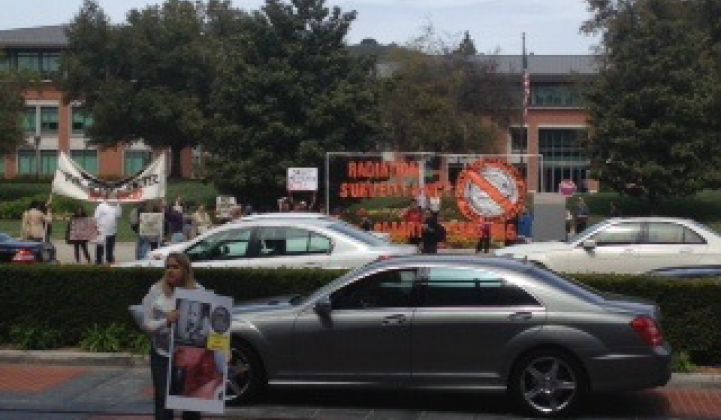Greentech Media’s annual smart grid showcase, The Networked Grid 2013, got off to a interesting start Wednesday morning with industry speakers, new global smart grid research -- and a few anti-smart meter protesters crashing the party.
Members of a group called Citizens for a Radiation Free Community disrupted a morning panel session at TNG, and gathered in front of the Four Seasons Westlake Village hotel to protest the event, bearing signs describing smart meters as “killer” devices that cause cancer, headaches and other health problems.
These complaints are familiar to utilities deploying smart meters around the country. From California to Maine and at points in between, we’ve seen a small but very vocal group of people claim that exposure to electromagnetic radiation from smart meters' wireless communications systems is causing them a myriad of health and mental problems.
Liz Barris, the organizer of Wednesday’s protest, told me that she’s suffered heart problems, stabbing pains in her head, debilitating fatigue and glandular problems since Southern California Edison installed a smart meter at her home. Other protesters told me that they’ve sold their homes and moved away after suffering what they believe are smart-meter-related health problems.
Those claims conflict with a multitude of studies and reports from utilities and third parties that have shown that smart meters emit far less electromagnetic radiation than do cell phones, microwave ovens and other devices that have been cleared for broad public use by the Federal Communications Commission. (On that note, the Citizens for a Radiation Free Community web page makes it clear that it believes cell phones are also a health risk, but some of Wednesday’s protesters were using their cell phones to take video of each other making statements against smart meters.)
Barris also said that her group is planning to file a class action lawsuit on behalf of people who believe their health has been affected by smart meters. She told me that the lawsuit will target utility Southern California Edison, as well as other investor-owned and municipal utilities in the state that have deployed smart meters.
Southern California Edison hasn’t faced the same kind of smart meter backlash as has its northern neighbor, Pacific Gas & Electric. PG&E has been at the epicenter of smart meter protests, with the opposition spreading from individuals blocking smart meter installation trucks, to city and county governments in Northern California declaring themselves smart-meter-free zones -- although it’s far from clear whether or not local governments have the legal authority to stop the utility from replacing its own meters.
PG&E and other utilities that have faced smart meter opposition, such as Central Maine Power, have also dealt with the issue by offering customers the chance to opt out of having a smart meter deployed at their home. They’ve also asked state regulators to allow them to charge those customers for the costs involved in needing to continue sending meter readers to read those meters, as well as the other benefits lost when they’re not replaced.
But these opt-out programs aren’t enough to satisfy Barris, who noted that smart meters at neighbors’ homes will still be emitting their radio waves, even if her home’s meter does not. We’ve seen a similar issue emerge in Central Maine Power’s proceeding on the health affects of smart meters, with smart meter opponents claiming that they won’t be satisfied unless all smart meters are taken out of their neighborhoods.
It’s hard to see how people with such strongly held views will come to terms with utilities that have already deployed millions of smart meters, and which have to follow FCC guidelines in terms of assessing the health risks associated with the networks they’re turning on. It certainly makes for some bad publicity for smart meters, which are meant to make utilities run more efficiently and eventually help individual consumers better manage their power use. Whether it’s deserved or not is another question.



